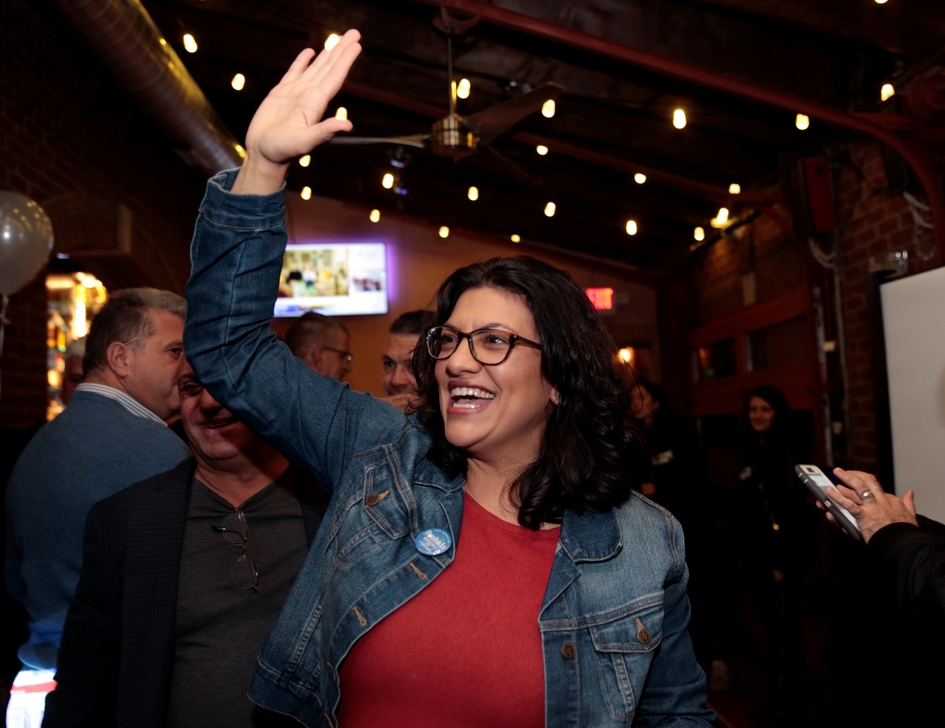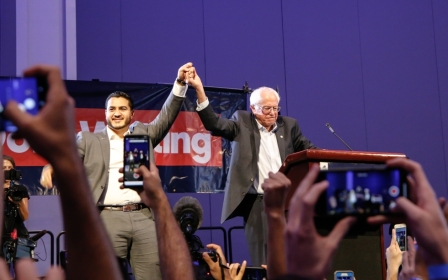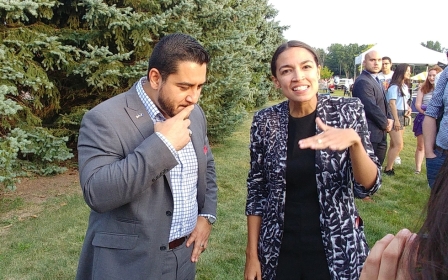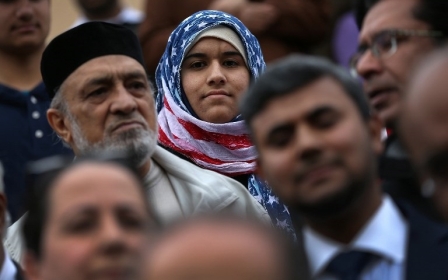Don't expect Rashida Tlaib to be a saviour for Palestinians in Congress. It's up to us all

I learned of Rashida Tlaib’s US Democratic primary victory on a Palestinian radio station. Hearing it that way highlighted the global implications of her successful campaign and the collective sense of pride among Palestinians - not because Tlaib happens to be of Palestinian descent, but because her Arab-Muslim identity has been central to her political compass, on behalf of marginalised communities throughout the US.
Tlaib is standing for Congress in a safe Detroit-based district. After the November election that she is all but certain to win, she will fill the seat of John Conyers, who served for five decades.
Rising lawmakers on the left of the political spectrum are not only failing on the question of Palestine, but on nearly all foreign policy matters
She will not be the first Palestinian American or Arab American elected to federal office, but Tlaib is different from past candidates whose heritage was viewed as a side note, or even a liability. Palestinian-American Justin Amash, for example, was elected to Congress on a conservative Republican platform.
Tlaib has represented her people tirelessly, with commitment and principle, waging internal battles at great personal risk and pain, including in a disturbing case of gender-based violence within the Arab American community. She took a bold stance before #MeToo was a vibrant movement.
That episode alone might have diminished anyone’s spirit to jump back into the public eye. But here she is, marching forward on behalf of a community she loves, and for whom she labours. I don’t rally for Tlaib because she is Palestinian, but because she is an organic leader, community-based, accountable, a fighter, and a sister with a vision.
Power from the bottom up
This does not mean we should give her a blank cheque; it is our responsibility to hold her to account, and to pave the path that will make this possible.
In the immediate aftermath of Tlaib’s primary victory, it was reported that she had received Israel lobby group J Street’s political endorsement, as well as a $3,000 donation to her political campaign. This sparked a public rebuke of Tlaib via social media, with demands that she reject the endorsement. She has since clarified her position, calling for US military aid to Israel to be cut due to its discriminatory policies, prompting J Street to rescind its endorsement - but the episode merits some consideration about the role of progressive minorities in Congress.
As an elected member of Congress she could play a role in our collective efforts to end US complicity in and support for Israeli apartheid and settler-colonialism
Tlaib will not change the world from the top down. She will do what she can based on the power we give her from the bottom up. This means better understanding what she is battling in her district. There is a lot we don’t know yet about the challenges she could face going forward.
For those who want Tlaib to publicly endorse the boycott, divestment and sanctions (BDS) movement as part of her platform and demand an end to US aid to Israel, consider joining her team and her campaign. Organise in her district and among her constituents. Help her build national networks that will protect her and enable her to properly represent us.
It is important to remember that Tlaib is not our saviour. We can only save ourselves, and as an elected member of Congress she could play a role in our collective efforts to end US complicity in and support for Israeli apartheid and settler-colonialism.
Collaborative tactics
Tlaib is an extension of our collective efforts - philanthropic, grassroots, journalistic, academic, artistic or otherwise. She is one piece in this matrix, and her ability to pave a path in Congress depends on our ability to keep digging and pushing in front of her.
We’ve made it possible for federal representatives to not defend Israel’s “right to self-defence” as it pummels Gaza, to legislate bills to protect Palestinian children, and to condemn anti-BDS legislation. These are our victories, and we should take pride in them.
We can be critical and simultaneously constructive. The choice is not between criticism and silence; rather, it is a strategic decision about how we express ourselves.
The deterrence tactic of hitting so hard as to push someone into capitulation may be a suitable policy for our enemies in certain circumstances, but it is almost never a suitable tactic for our allies, where we have numerous alternative strategies: phone calls, letters, meetings, and other forms of collaboration.
As such, the immediate condemnation of Tlaib was strange and troubling to witness, as though she has already betrayed our movement and community, without the slightest faith that our collaborative approach could be effective.
Entering Congress is its own beast. Any new member needs up to two terms - four years and two electoral victories - to secure their seat, and we should be patient as they orient themselves within the political establishment.
Congressional representatives are by definition on the inside, so for unwavering radicals, that alone is worthy of contempt. However, if you believe congressional office is a worthwhile endeavour, you should consider the different tactics that can govern this terrain.
A new wave of politics
We should be open to tactics besides deterrence not just because of Tlaib’s campaign, but because of the message it sends to our youth, who are eager to throw themselves into the fight but who are not finding direction. We should place high standards on our community leaders but also on ourselves; it is much easier to destroy something than it is to build it, and I would rather see folks try and fail than stand by in paralysis.
Rising lawmakers on the left of the political spectrum are not only failing on the question of Palestine, but on nearly all foreign policy matters. Perhaps this reflects their district concerns, but regardless, they have failed to adequately connect militarism abroad with our troubled domestic systems, remained mum on US interventionism in the Middle East, and neglected to tackle the rise of the far-right in Europe and the lack of sustainable solutions for refugees.
The current problem is not just about Palestine, but about a new wave of politics in dire need of a global scope. Our focus on the missteps over Palestine obscures the fact that there is a major blindspot among new candidates on imperialism and militarism in general - a signal of the ongoing work that must be done.
- Noura Erakat is a human rights attorney and activist and an assistant professor at George Mason University. She has taught international human rights law in the Middle East at Georgetown University since Spring 2009. Noura is a co-editor of Jadaliyya.
The views expressed in this article belong to the author and do not necessarily reflect the editorial policy of Middle East Eye.
Photo: Rashida Tlaib, a Palestinian American and former Michigan state representative, won a seat in the US Congress (Reuters)
Middle East Eye propose une couverture et une analyse indépendantes et incomparables du Moyen-Orient, de l’Afrique du Nord et d’autres régions du monde. Pour en savoir plus sur la reprise de ce contenu et les frais qui s’appliquent, veuillez remplir ce formulaire [en anglais]. Pour en savoir plus sur MEE, cliquez ici [en anglais].





